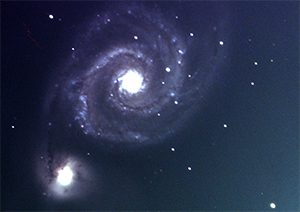Observing the Stars will be held on campus May 4
The Indiana University East School of Natural Science and Mathematics will host Observing the Stars from 9-11 p.m. on Friday, May 4, in the main drive to campus near Horizon Parkway and the Whitewater Hall parking lot.

The Whirlpool Galaxy is just one of the views star gazers might see during Observing the Stars at IU East on May 4. Photo by Wes Tobin and Ron Ennis.
The event is free and open to the public. This is a family-friendly event.
Wes Tobin, assistant professor of physics at IU East, is organizing Observing the Stars. He hopes that this event will lead to further opportunities throughout the summer. Ron Ennis, IU East Student and astronomy research assistant, and community member volunteer, Dan Engel, will also be available to answer questions.
Tobin said three telescopes will be available – a 6,” 8” and 16” diameters telescopes – to look at various astronomical objects. He encourages those interested in viewing the night sky to bring their curiosity and questions. He adds viewers can come and go throughout the evening, but the best views will be after 10 p.m.
If the night is clear, he expects participants to see open star clusters (such as Praesepe and M67), globular star clusters (such as M3, M5, M13 and M53), binary stars and galaxies (such as M81, Whirlpool, and Pinwheel).
“Near the end of the night, we’ll be able to see Jupiter and its moons Callisto, Ganymede, Io and Europa,” Tobin said. “In addition to observing through the telescopes, between observations, I will be giving a night sky tour, where I use an easy-to-see green laser pointer to point out various stars, constellations and maybe even discuss the stories behind them.
Tobin has led public observing programs since 2001. “I have enjoyed observing with telescopes since I was very young,” Tobin said. “I am always looking forward to passing on the enjoyment of observing the night sky to the general public or even the next generation.”
He has his Doctor of Education in Science from Ball State University and his M.S. in Astrophysics from Iowa State University.
“I have found that most people simply enjoy the beauty of the heavens and are taken aback by the scales and distances of the universe. For instance, seeing a distant galaxy and realizing that there are billions, perhaps hundreds of billions of stars in that galaxy … with a few million being somewhat similar to the Sun, and a handful of those may contain the correct ingredients and environment for extraterrestrial life,” Tobin said.
If the weather on May 4 is cloudy or rainy, Observing the Skies will be held on Friday, May 18. Updates can be found on the Astronomy at IU East Facebook page at facebook.com/astronomyiue.

